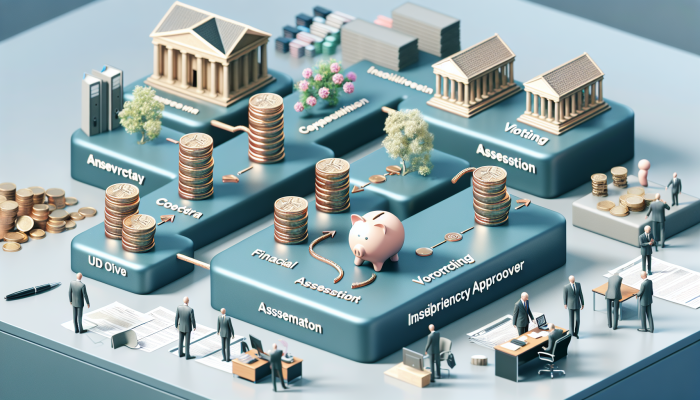Master Debt Management Plans: Your Ultimate Resource for Financial Control
Key Components of a Successful Debt Management Plan You Need to Know

The concept of a Debt Management Plan (DMP) is an invaluable strategy aimed at helping individuals take charge of their debt effectively. This personalised plan is designed to bundle multiple debts into a single, manageable monthly payment, which is often associated with significantly lower interest rates. The DMP is typically implemented under the guidance of a qualified credit counselling agency, providing a solid framework for those who feel overwhelmed by competing demands from various creditors. By working closely with an experienced professional, individuals can simplify their financial obligations, regain mastery over their financial circumstances, and ultimately improve their overall quality of life.
Seeking assistance from a reputable credit counselling organisation can mark a crucial turning point on your journey towards financial recovery. These organisations engage in proactive negotiations with creditors on behalf of the debtor, striving to secure more favourable repayment terms. For many, this leads to reduced monthly payments, significantly relieving the stress of managing multiple debts. In a time when financial literacy is increasingly important, DMPs empower individuals to develop a clearer understanding of their financial landscapes while cultivating effective management strategies.
Discover the Comprehensive Advantages of Implementing Debt Management Plans
The advantages of adopting a Debt Management Plan are extensive, beginning with the immediate financial relief it offers. By consolidating various debts, individuals can substantially lower their monthly repayment obligations, making the overall management of their finances more achievable. This alleviation in payment commitments can lead to reduced stress levels, allowing individuals to focus on rebuilding their financial lives rather than feeling overwhelmed by anxiety stemming from increasing debts.
Another major benefit of DMPs is the halt on creditor harassment. Once a DMP is established, creditors are typically barred from contacting the debtor directly, with all communications managed through the credit counselling agency. This arrangement significantly reduces the stress associated with incessant phone calls and letters from creditors. Furthermore, as individuals consistently adhere to their payment plans through the DMP, they often experience a gradual improvement in their credit scores. This positive change can unlock enhanced financial opportunities in the future, such as qualifying for loans or mortgages at more favourable interest rates.
Moreover, DMPs incorporate an educational component, equipping individuals with vital knowledge to comprehend their financial behaviours while promoting improved budgeting practices. This holistic approach not only addresses immediate debt challenges but also encourages long-term financial wellness, ensuring individuals are better equipped for future financial decisions.
Finding a Reputable Provider for Debt Management Plans Across the UK
Identifying a reliable Debt Management Plan provider in the UK necessitates careful scrutiny of reputable credit counselling agencies. Established organisations such as StepChange and PayPlan offer trustworthy services tailored to meet the unique needs of individuals grappling with debt. These agencies often provide free assessments to evaluate one’s financial situation and develop a customised DMP that aligns with their specific circumstances.
When selecting a credit counselling agency, it is essential to undertake thorough research into their credentials and client reviews. Look for organisations that are affiliated with recognised industry bodies, such as the Financial Conduct Authority (FCA) or the Money and Pensions Service (MaPS). Membership in these organisations adds an essential layer of security and assurance that the agency adheres to professional standards and best practices.
Additionally, individuals can tap into a wealth of online resources, including forums and social media platforms where others share their experiences with different agencies. This community feedback can be invaluable in making an informed choice. Ultimately, selecting the right DMP provider can establish the foundation for a successful path towards financial stability.
In-Depth Analysis of Individual Voluntary Arrangements (IVAs)

Essential Insights into Individual Voluntary Arrangements (IVAs)
An Individual Voluntary Arrangement (IVA) represents a legally binding agreement between a debtor and their creditors, designed to facilitate debt repayment over a specified period, typically lasting five years. IVAs are particularly advantageous for individuals overwhelmed by debt who wish to avoid the severe consequences associated with bankruptcy. This entire procedure is overseen by an insolvency practitioner, who acts as a mediator between the debtor and their creditors.
The appeal of IVAs lies in their structured approach to debt repayment. Individuals propose a manageable monthly payment, which is then distributed among their creditors. In many cases, this can lead to the cancellation of a portion of the debt, making it a feasible option for those with limited means to repay their total liabilities. By entering into an IVA, individuals can safeguard their assets while diligently working towards achieving a debt-free status.
The legal framework surrounding IVAs provides protection for the debtor. Once established, creditors are generally prohibited from taking further action to recover debts, thus granting essential breathing room. This structured solution is designed to facilitate financial recovery while enabling individuals to maintain a degree of normalcy in their daily lives.
Essential Criteria for Qualifying for an Individual Voluntary Arrangement (IVA)
To be eligible for an Individual Voluntary Arrangement (IVA), several specific criteria must be met. Firstly, individuals must demonstrate that they possess a reliable income capable of sustaining monthly repayments throughout the duration of the IVA. This income may come from various sources, including employment, self-employment, or benefits.
Moreover, the total debt must generally exceed £5,000, and the individual should have at least two creditors. These prerequisites ensure that IVAs cater to individuals facing significant debt challenges rather than those with minor financial issues. Additionally, creditors must also consent to the IVA proposal, adding an extra layer of complexity to the process.
A critical aspect of the IVA application involves demonstrating the ability to adhere to the proposed repayment plan. This often necessitates presenting a comprehensive budget that outlines how the individual plans to meet their obligations. Collaborating with a seasoned insolvency practitioner can provide invaluable support throughout this process, assisting individuals in preparing the necessary documentation and effectively navigating negotiations with their creditors.
Your Comprehensive Guide to the IVA Process in the UK

The IVA process in the UK consists of several distinct steps, starting with an assessment of the individual’s financial situation. After engaging an insolvency practitioner, the first step involves gathering all pertinent financial data, including income, expenses, and total debts. This information will form the basis of the IVA proposal submitted to creditors.
Once the proposal is crafted, it is presented to creditors for their review and approval. A meeting is typically convened where creditors can vote on the proposal. For the IVA to be accepted, a minimum of 75% of the creditors (by value of debt) must agree to the terms. If consensus is achieved, the IVA is then formalised and becomes legally binding.
Throughout the duration of the IVA, individuals are expected to make consistent payments according to the agreed-upon plan, with the insolvency practitioner overseeing the distribution of these payments to creditors. It is crucial to comply with the terms of the IVA; any failure to do so could result in the arrangement being rendered void. The process typically lasts five years, after which any remaining unsecured debts are written off, allowing the individual a fresh start in their financial journey.
Assessing the Advantages and Disadvantages of Individual Voluntary Arrangements
Individual Voluntary Arrangements offer numerous benefits for those confronting debt challenges. Foremost among these is the ability to consolidate liabilities while steering clear of bankruptcy. This can be a vital consideration for individuals eager to protect their assets, including their homes or vehicles. Additionally, IVAs present a structured repayment plan, enabling individuals to regain control over their financial circumstances.
Another significant advantage is the potential for debt forgiveness. Upon successful completion of the IVA, any outstanding debts are written off, allowing individuals to embark on a new financial chapter. This fresh start can be particularly liberating, fostering increased financial freedom moving forward.
However, IVAs come with their own set of drawbacks. One of the most notable disadvantages is the impact on an individual’s credit rating. The arrangement is recorded on the person’s credit file and remains for approximately six years after completion. This can impede the ability to secure credit during and following the IVA period, adversely affecting future financial prospects.
Moreover, strict adherence to the repayment plan is essential. If an individual misses payments or fails to comply with the established terms, they risk having their IVA revoked, which may lead creditors to pursue full repayment or even initiate bankruptcy proceedings. Therefore, while IVAs can serve as a powerful tool for managing debt, they necessitate discipline and unwavering commitment to achieve successful outcomes.
Exploring Debt Relief Orders (DROs): A Practical Solution for Unmanageable Debt
Understanding the Functionality of Debt Relief Orders
Debt Relief Orders (DROs) act as a vital lifeline for individuals grappling with unmanageable debt. Recognised as a formal insolvency solution, a DRO is specifically tailored for those with limited income and minimal assets. The primary objective of a DRO is to freeze debts for a period of one year, during which creditors are prohibited from taking action to recover the outstanding amounts. If the individual’s financial situation remains unchanged, the debts may potentially be written off entirely after this period.
DROs are especially advantageous for individuals who may not qualify for alternative debt solutions, such as Individual Voluntary Arrangements (IVAs) or bankruptcy. The straightforward application process makes it accessible to many experiencing financial hardship. By relieving debtors from the pressures of mounting financial burdens, DROs can pave the way for a more manageable financial future.
The process for obtaining a DRO typically involves submitting an application through an approved intermediary, such as a debt advice agency. This professional guidance can be invaluable, helping individuals navigate the complexities of the process while ensuring they meet the necessary eligibility criteria.
Eligibility Criteria for Debt Relief Orders in the UK
To qualify for a Debt Relief Order in the UK, individuals must adhere to several specific requirements. Firstly, they should owe less than £30,000 in total unsecured debts. This cap ensures that DROs are directed towards individuals genuinely experiencing financial distress, rather than those managing minor debt levels. Additionally, applicants should possess assets valued at less than £2,000, ensuring the solution is focused on individuals with limited resources.
Another critical requirement is that the individual’s disposable income must be less than £75 per month. This income threshold reinforces the DRO’s design, which seeks to assist those who genuinely lack the means to repay their debts. By establishing these parameters, DROs provide a safety net for individuals during their most vulnerable times.
The application process for a DRO is straightforward, but it requires thorough documentation. Individuals must provide comprehensive information regarding their financial situation, including income, expenditures, and total debts. Collaborating with an approved intermediary is crucial, as they can guide applicants throughout the process, ensuring that all necessary paperwork is accurately completed and submitted.
Steps to Successfully Secure a Debt Relief Order
An approved intermediary, such as a debt advice agency or a charitable organisation, typically facilitates the application for a Debt Relief Order. This intermediary plays a vital role in guiding the applicant through the entire process, ensuring that they meet all eligibility requirements while effectively managing the necessary documentation.
The application incurs a fee of £90, which is often viewed as a modest cost for the relief that accompanies a DRO. Once the application is submitted, the intermediary will evaluate the individual’s financial circumstances and assist in completing the required forms. This includes providing evidence of income, expenses, and total debts, all of which are critical for a successful application.
After submission, the application is forwarded to the Insolvency Service for consideration. If approved, the DRO will be granted, and creditors will be formally notified of this arrangement. For a year, the debtor is protected from creditor actions, providing them with a sense of relief while they work towards achieving financial stability.
The Impact of Credit Unions on Debt Management Explained
Understanding How Credit Unions Function and Their Key Benefits
Credit unions serve as community-oriented alternatives to traditional banking institutions. Operated as member-owned financial cooperatives, their primary mission is to serve their members rather than generate profits. This unique model makes credit unions particularly appealing to individuals with poor credit histories, as they often provide loans at lower interest rates compared to conventional lenders.
Members of credit unions can access a diverse range of financial products, including savings accounts and loans. The cooperative nature of credit unions fosters a sense of community, empowering individuals to support one another financially. Furthermore, they frequently offer financial education and guidance, equipping members with the tools to make informed decisions regarding their financial matters.
A significant advantage of credit unions is their openness to collaborating with members who may have faced obstacles in securing credit elsewhere. This inclusiveness positions them as an excellent option for individuals searching for debt consolidation alternatives with bad credit. The focus on community and mutual support enables members to rebuild their financial futures sustainably.
How to Locate a Suitable Credit Union in the UK
Finding an appropriate credit union in the UK is quite straightforward, with numerous local options available. Notable credit unions, such as the London Mutual Credit Union and the Manchester Credit Union, serve diverse communities while providing a variety of financial services tailored to meet the needs of their members.
Many credit unions maintain a robust online presence where individuals can review their services, membership criteria, and loan options. It is essential to assess the specific criteria for membership, as some credit unions may cater to particular geographic areas or occupational groups. This targeted approach enhances the sense of community, ensuring that members share similar interests or backgrounds.
Additionally, individuals can compare various credit unions through financial comparison websites. These platforms often provide valuable insights into interest rates, fees, and member reviews, making it easier for prospective members to make informed choices regarding where to apply.
The Advantages of Engaging with Credit Unions for Financial Health
Engaging with a credit union comes with numerous benefits, especially for individuals seeking debt consolidation alternatives for bad credit. One of the most immediate advantages is access to affordable loans. Credit unions typically offer lower interest rates than high-street lenders, facilitating manageable repayments without overwhelming financial pressure.
Moreover, credit unions frequently prioritise member education and financial literacy. By providing resources and guidance, they empower individuals to better understand their financial situations and cultivate healthier financial habits. This educational component can be invaluable for those aiming to break free from cycles of debt and achieve long-term financial wellness.
The community-oriented approach of credit unions fosters a sense of belonging and support among members. Rather than viewing individuals merely as statistics, credit unions often invest in their members’ success, creating a more personalised banking experience. This emphasis on community can help individuals feel more comfortable seeking financial assistance and guidance, ultimately leading to improved financial outcomes over time.
Steps to Become a Member of a Credit Union
Joining a credit union is generally a straightforward process. Most credit unions require individuals to either reside or work within the area they serve. Alternatively, some may have specific membership criteria based on profession or other affiliations.
To join, prospective members usually need to complete an application form and may be required to open a savings account as part of the membership process. The initial deposit for this savings account is often nominal, ensuring that membership is accessible to a wide range of individuals.
Once membership is confirmed, individuals can access the various financial products and services offered by the credit union. This may include low-interest loans, savings accounts, and financial counselling. By fostering a sense of community while providing tailored financial solutions, credit unions can significantly enhance members’ financial health and stability.
A Thorough Overview of Services Provided by Credit Unions
Credit unions offer a broad array of services tailored to meet their members’ needs. In addition to traditional offerings like savings accounts and loans, many credit unions provide current accounts, financial advice, and budgeting tools. This comprehensive suite of services empowers individuals to manage their finances more effectively.
For those seeking to consolidate debt, credit unions often offer specialised loan products aimed at helping individuals pay off higher-interest debts more efficiently. These tailored loans can be an essential resource for those grappling with multiple debts, providing a simpler repayment solution with more manageable terms.
Additionally, many credit unions actively participate in community initiatives, offering resources and educational workshops that focus on financial literacy and responsible borrowing. This commitment to member education not only helps individuals manage their finances more effectively but also nurtures a culture of financial responsibility within the community.
In summary, the services offered by credit unions are designed to empower individuals on their financial journeys. By focusing on community support and sustainable financial solutions, credit unions offer a viable alternative for individuals seeking debt consolidation options with poor credit.
Decoding Secured Loans: A Detailed Financial Overview
Understanding the Basics of Secured Loans
Secured loans represent a borrowing method where an asset, such as a home or vehicle, is used as collateral. This collateralisation often results in lower interest rates compared to unsecured loans, making secured loans a potentially attractive option for individuals with poor credit histories. By providing the lender with security in the form of an asset, borrowers may gain access to larger loan amounts and more favourable repayment conditions.
These loans are frequently utilised for significant expenditures, such as home improvements, debt consolidation, or major purchases. The availability of higher loan amounts makes secured loans appealing for individuals looking to manage existing debts effectively. However, it is crucial for borrowers to carefully consider their capacity to repay the loan, as defaulting on secured loans can lead to the loss of the asset used as collateral.
In the UK, a variety of lenders provide secured loans, each with distinct terms and conditions. Borrowers should conduct thorough research and compare offers to ensure they secure the most advantageous deal possible.
Evaluating the Risks Linked to Secured Loans
While secured loans offer numerous benefits, they are not without risks. One significant concern is the potential loss of the collateral if payments are not consistently maintained. Should a borrower default on their loan, the lender reserves the right to repossess the asset, leading to substantial financial and emotional distress.
Moreover, secured loans may tempt individuals to borrow more than they can realistically afford, particularly if they are already facing financial difficulties. The allure of lower interest rates can create a misleading sense of security regarding repayment capacity. Borrowers must critically assess their financial situations and ensure they can meet their obligations before proceeding with a secured loan.
Another consideration is the potential for high fees associated with secured loans, especially if the borrower opts for an extended loan term. These additional costs can accumulate rapidly, negating the initial benefits of lower interest rates. Individuals must carefully scrutinise the terms of any secured loan agreement, paying close attention to fees and repayment stipulations.
How to Identify Appropriate Secured Loans in the UK
To discover suitable secured loans in the UK, individuals should start by researching reputable lenders. Established banks and credit unions typically offer a variety of secured loan products, ensuring their practices and terms are transparent. Online comparison tools can also be beneficial, enabling borrowers to assess interest rates, fees, and terms across multiple lenders.
When exploring secured loan options, it is critical for individuals to carefully consider their financial circumstances. This includes evaluating their credit score, income, and existing financial commitments. By obtaining a clear understanding of their situation, borrowers can identify lenders willing to work with them, particularly if they have a less-than-perfect credit history.
Furthermore, seeking advice from financial advisers or debt management experts can offer valuable insights into the most suitable secured loan options. These professionals can assist individuals in understanding the implications of secured borrowing, guiding them towards responsible lending practices.
Various Types of Secured Loans Available for Borrowers
Secured loans come in various forms, each featuring unique characteristics and applications. Common types include home equity loans, mortgage loans, and car loans, each using different assets as collateral. Home equity loans allow borrowers to tap into the equity they have built in their homes, providing access to substantial amounts of credit for various purposes, including renovations or debt consolidation.
Mortgage loans represent another prevalent form of secured borrowing, often associated with property purchases. For individuals with poor credit, finding mortgage lenders willing to consider their applications and offer competitive rates is crucial.
Car loans also fall within the realm of secured loans, where the vehicle itself serves as collateral. This type of loan can be more accessible for those with poor credit, as lenders have tangible assets to reclaim in the event of default. When evaluating secured loans, individuals should assess their specific needs and financial circumstances to determine which type of secured loan is most suitable for their situation.
Common Questions Regarding Debt Management Answered
What is the process of consolidating debt?
Debt consolidation involves merging multiple debts into a single loan or payment plan, often to secure lower interest rates and simplify repayment.
What is the function of a Debt Management Plan?
A Debt Management Plan consolidates various debts into a single monthly payment, negotiated by a credit counselling agency to reduce interest rates and simplify the repayment process.
What are Individual Voluntary Arrangements (IVAs)?
IVAs are formal agreements established with creditors to repay debts over a fixed period, typically five years, and are supervised by an insolvency practitioner.
Who qualifies for a Debt Relief Order (DRO)?
To be eligible for a DRO, individuals must owe less than £30,000, possess assets valued under £2,000, and have a disposable income of less than £75 per month.
What advantages do credit unions offer their members?
Credit unions provide lower interest rates on loans, offer financial education, and adopt a community-focused banking approach, making them accessible to individuals with poor credit.
Are secured loans a suitable option for individuals with bad credit?
Secured loans can be beneficial for individuals with bad credit due to lower interest rates, but they carry risks, including the potential loss of collateral.
Can I apply for a Debt Management Plan on my own?
While individuals can initiate a DMP independently, collaborating with a credit counselling agency is often advantageous for negotiating terms and effectively managing payments.
What are the consequences of missing a payment on an IVA?
Failing to make a payment on an IVA may result in the arrangement being revoked, potentially causing creditors to pursue full repayment or initiate bankruptcy proceedings.
What is the duration of a Debt Relief Order?
A Debt Relief Order remains effective for one year, after which any outstanding unsecured debts can be written off if there are no changes to the debtor’s financial situation.
What financial products can credit unions provide to their members?
Credit unions typically offer a variety of financial services, including loans, savings accounts, current accounts, and tailored financial counselling to meet member needs.
Connect with us on Facebook for more insights!
This Article Was First Found On: https://www.debtconsolidationloans.co.uk
The Article Debt Consolidation Alternatives: Solutions for Bad Credit in the UK Was Found On https://limitsofstrategy.com
References:
Debt Consolidation Alternatives: Solutions for Bad Credit in the UK



